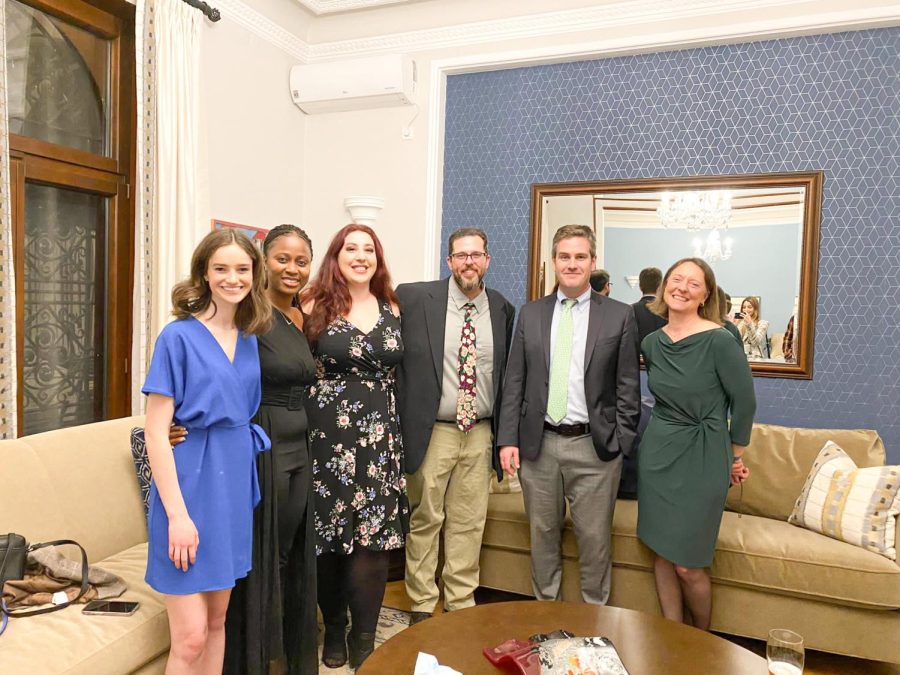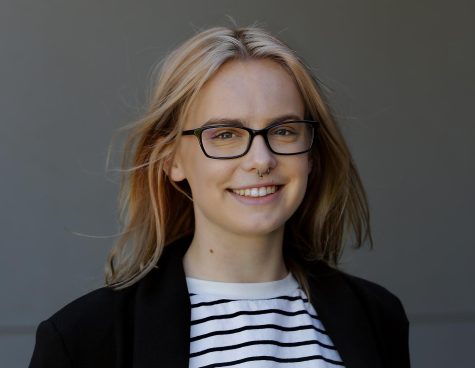Students to write articles about Serbia spring break trip
Interviewed independent journalists; trip gave insight to different culture of journalism field
Pictured left to right, students Abby Davis, Sona Porter, Nichole Bascue and Rick Sinnett with U.S. Embassy Spokesman Jim Hagengruber and scholarly assistant professor Alison Boggs.
March 23, 2022
Instead of leaving the country for a relaxing spring break, a group of four WSU students traveled over 5,000 miles to Belgrade, Serbia to experience a diverse media environment and create news articles about their experience.
Nichole Bascue, senior integrated strategic communication major, said WSU’s Backpack Journalism Program allows students to travel internationally to explore a specific region and culture.
“[Part] of us going to Serbia was to understand what press freedom looks like on their side of the world because they are living in a world of extreme polarization,” Bascue said.
The U.S. traditionally has an independent news media, so being able to go to a place that is more polarized helped them understand the privileges available in the U.S., she said.
Rick Sinnett, junior integrated strategic communication major, said the people in the group interviewed independent journalists and fact-checkers.
“We interviewed … organizations that are trying to fight disinformation inside Serbia, and it’s quite an uphill struggle for them, just because of the way everything is set up,” Sinnett said.
All four of the students attended the interviews together but asked their own questions to benefit their personal work, Bascue said.
If needed, the students reached out to additional resources in the U.S. because they are targeting their articles at people in Washington state, she said.
Alison Boggs, scholarly assistant professor in the Edward R. Murrow College of Communication, was the academic lead for the trip, and she helped someone from an independent organization of journalists set up 90% of the interviews, Bascue said.
“That was just with people that were across the spectrum of journalism,” she said. “Depending on the stories we wanted to do, we looked up people who were in Serbia and tried to schedule meetings with them.”
Sinnett said he had to miss one of the interviews because he was in the hospital because of dehydration. While the rest of the group went to a school in Belgrade, he was hooked up to an IV. Boggs stayed at the hospital with him to make sure he was okay.
“She hung around and definitely took care of everything, which I deeply appreciate,” Sinnett said. “My wife and kids appreciate it too.”
The four students are currently working on articles about their experience in Serbia. Bascue said her article is not fully finished yet, and it took a couple of turns.
“That is really important for me because you want the story that you’re writing to reflect accurately what’s going on,” she said.
Sinnett said he has a few articles coming out of this experience, but the main one will focus on independent journalists and what they do in Serbia.
He has multiple hours of audio and multiple photos to put together, and he is working on cleaning them up to finish his articles.
Sinnett said he applied for the trip because his former editor at The Clipper, Everett Community College’s newspaper, suggested it to him. She saw his dedication to freedom of the press and speech, as well as journalism.
“When I found out that the backpack journalism program was going to Serbia, I definitely wanted to go,” he said. “It’s been an area of interest of mine for a bit.”
Bascue said she applied for the trip because she wanted to do something journalism-related that was new for her.
Along with Sinnett, she already has experience working with a newspaper at The Clipper, but felt like she needed to do something different, she said.
“I happened to find [this opportunity] online because I’m at the Everett campus and it just seemed like the next step as a senior,” Bascue said. “It allowed me to flesh out my personal resume while feeling like I did something important.”
Bascue said working with the people she met on the trip stuck with her because she was able to connect with others who had similar experiences as her but different cultural backgrounds.
She was able to ask them about certain tools they used, like an outdated computer system, she said. In turn, the people Bascue met got to ask her questions about American culture because most of them had only experienced it through TV.
“Just being able to have a candid conversation with somebody who was the same but entirely different was really just miraculous,” Bascue said.
Sinnett said he made connections with established journalists who gave him insight into a different life within the journalism field.
He said he spoke with someone who had to add additional deadbolts to her door because people continued breaking in and leaving messages saying they did not like the topics she wrote about.
“We don’t really come to that in the United States,” he said. “We don’t encounter journalists really dealing with that level of corruption inside of the government. I mean, they will face danger when dealing with organized crime, but not from their own government.”
Even though this experience does not directly impact the integrated strategic communication major, Sinnett said it has helped him gain insight into the journalism field.
Bascue said this experience was beneficial in ways she was not anticipating. She did not expect to feel the connection she got with the people she met.
The biggest takeaway Bascue had was the different aspects of fact-checking. She wants to incorporate that more in her professional life.
“I want to take fact-checking as something that I wasn’t as passionate about and make it something that I am passionate about and reinvesting in the investigative aspects of a story,” she said.
Not only did Bascue and the rest of the group have the opportunity to connect with people from a different culture, but they were also able to connect with each other because of their similar interests.
Bascue said she knew Sinnett and Sona Porter, the third member of the group, from The Clipper; she met the fourth, Abby Davis, at the beginning of the trip.
“Abby was essentially a stranger, but we left talking about how we needed to make sure to not fall apart or fall off the map,” she said.
Bascue said having that group of students who were passionate in the same field was like having a support group.
While each of them had a different motive for their articles, they were still going to the same interviews, she said.
“It was really supportive and definitely an unexpected win because nobody was stepping on toes,” Bascue said. “Nobody felt undermined, and everybody got to really learn about each other.”










